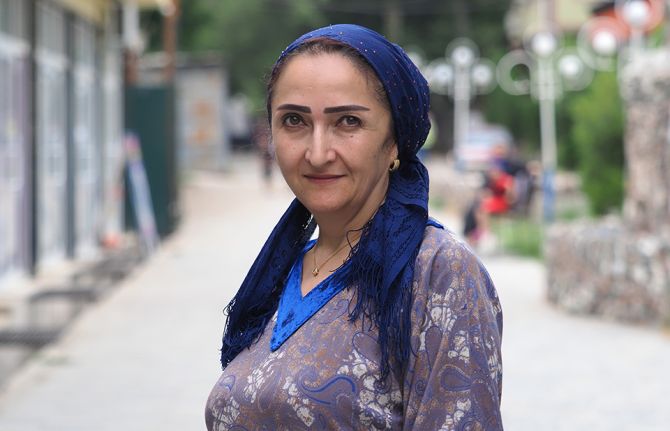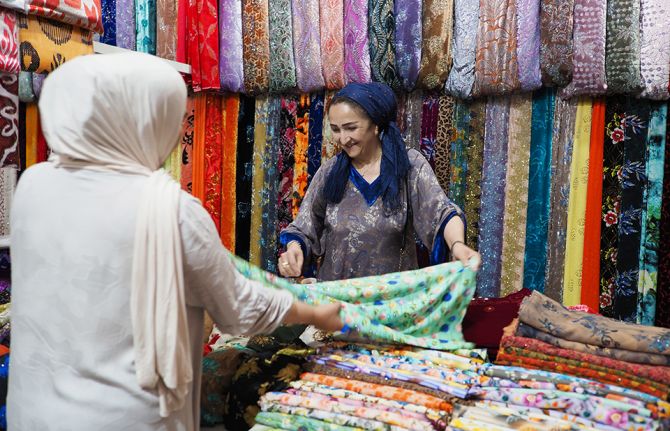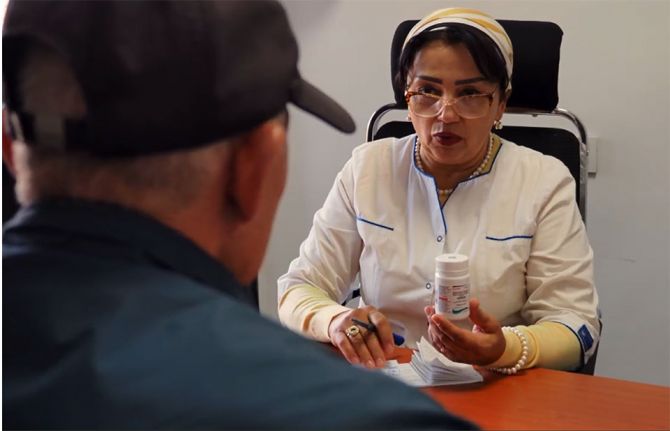



Feature Story
Power to earn and live—overcoming inequalities and supporting women living with HIV in Tajikistan
23 July 2025
23 July 2025 23 July 2025This story was first published in the UNAIDS Global AIDS Update 2025 report.
The day for Safargul begins at 04:00 and rarely ends before midnight. She juggles the demands of raising four children, tending a vegetable garden and managing the household in the small city of Kulyab in Tajikistan. Twice a week, she works at the local AIDS centre as a peer consultant. She supports women newly diagnosed with HIV, helping them understand the importance of starting treatment and not giving up hope.
Safargul has been living with HIV since 2006. No one in her community knows her HIV-positive status. “It would mean the end of normal life,” she says. “People would exclude me from gatherings, from everyday conversations.”
Her husband and eldest son were migrant workers abroad—just like the husbands of many of the women she now supports. “I see young women infected by their husbands and refusing treatment because they fear someone in the family might find out. They do not know enough, and they have no power to protect themselves,” she says.
Safargul is worried that most of these women are economically dependent on their husbands and their families. In Tajikistan, one of the poorest countries in central Asia, nearly 30% of gross domestic product comes from remittances, with many men migrating to Kazakhstan or the Russian Federation for work. According to the National AIDS Center, in 2015 one in eight new HIV cases was linked to male labour migration, but that figure rose to one in three by 2023. As a result, the risk of HIV infection among women—especially in rural communities—has crept up.
Takhmina Haidarova knows this risk firsthand. She was raised in a traditional household and then married a man who worked abroad and rarely came home. After the loss of their child, she hoped another pregnancy would ease the pain— but during a routine check-up, she learned she was living with HIV.
“I did not even know HIV existed in Tajikistan,” she recalls. Her husband rejected her, and his family blamed her after he died of an AIDS-related illness. “I had no knowledge, no support, and no one to turn to.”
Takhmina now leads the Tajikistan Network of Women Living with HIV. With support from UNAIDS, and together with a local team of researchers, the Network conducted a time-use survey in 2024, which revealed the systemic inequalities facing women living with HIV. Nearly 80% are homemakers and spend more than eight hours a day on unpaid labour. Most need permission from their husbands to visit a health facility. For many women, autonomy over health decisions comes only after divorce or widowhood. Tragically, 97% of women living with HIV in Tajikistan hide their HIV-positive status, even from family members.
“My mother-in-law knows her son infected me,” one woman says, “but still she will not accept a cup of tea from me.”
For Zarina from Tursunzade, change began with business skills training and a small grant from UNAIDS and UN Women. After leaving an abusive marriage and becoming a single mother, she built a sewing business that now employs women living with HIV. She also teaches women affected by HIV—including those in remote rural areas—how to start their own small sewing businesses.
“Thanks to this support, I became independent—and I can help others who were abandoned like I was,” she says.
UNAIDS Country Director in Tajikistan, Aziza Hamidova, refers to the recent gender assessment study led by UNAIDS, which concluded that restrictive gender norms, entrenched practices, stigma, discrimination and gender-based violence hinder timely access to health services, including for HIV. “The HIV response must reflect the real lives of women,” she says. “It must support their right to grow, earn and live with dignity.”
Progress in supporting HIV services for women is fragile. Funding cuts as small as 10–20% could reverse years of gains. More than 60% of the HIV response in Tajikistan is funded by the Global Fund and PEPFAR with the United States Government, and only 37% is funded domestically. UNAIDS and partners are worried that funding cuts may deepen deprivation and perpetuate stigma, leaving women living with HIV to bear the burden of survival and exclusion. “Investing in women’s health, safety and economic power is not just smart—it is urgent,” Aziza says.
Global AIDS update 2025
Region/country
Related
 Women, HIV, and war: a triple burden
Women, HIV, and war: a triple burden

12 September 2025
 Displacement and HIV: doubly vulnerable in Ukraine
Displacement and HIV: doubly vulnerable in Ukraine

11 August 2025

